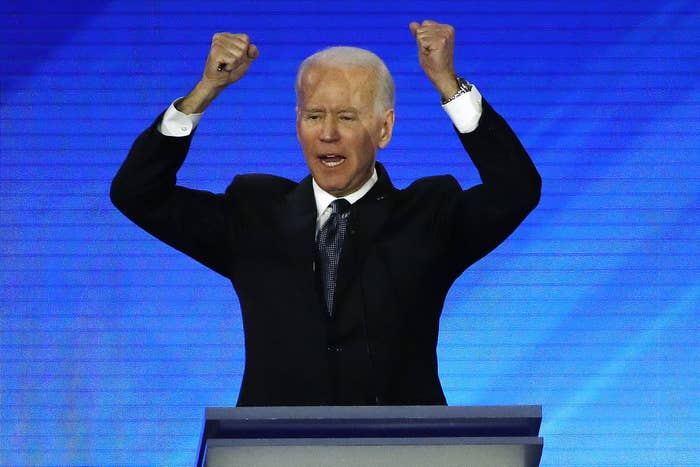
Joe Biden was more combative and forceful in Friday night’s Democratic debate than he has been for much of the last year, as he tries to keep his campaign alive after a tough week in Iowa and days away from New Hampshire, where other candidates have distinct advantages in Tuesday’s primary.
“Bernie's labeled himself, not me, a democratic socialist. I think that's the label that the president's going to lay on everyone running with Bernie if he's a nominee,” he said on the debate stage after moderator George Stephanopoulos asked him if the two leaders out of Iowa, Sen. Bernie Sanders and former South Bend mayor Pete Buttigieg, are "too big a risk for Democrats."
“Mayor Buttigieg is a great guy and a real patriot. He's a mayor of a small city who has done some good things, but has not demonstrated he has the ability to — and we'll soon find out — to get a broad scope of support across the board, including African Americans and Latinos,” Biden continued.
The message was loud and direct: Joe Biden, despite what you may have heard, is fighting.
“Earlier this week, we took a gut punch,” Biden said in a fundraising email to supporters almost as soon as the debate ended, a line he first used at a campaign event in New Hampshire on Wednesday morning. “But I’ve never been more ready to fight, and anyone on that stage tonight who counted me out was dead wrong.”
“He’s fighting," a senior Biden adviser told reporters on a conference call before the debate. "I think you saw that from him this week.”
Biden’s schedule in New Hampshire this week, however, was noticeably sparser than Buttigieg’s — while the two other frontrunners, Sanders and Sen. Elizabeth Warren, were called back to Washington in the middle of the week to tie up the impeachment process. Biden was out of New Hampshire on Thursday for meetings with advisers.
On Friday night Biden amped up his attacks on competitors — something he started to do on the campaign trail in New Hampshire earlier this week, but laid out at more length during the debate — and continually emphasized his experience in the Senate and role in the Obama administration.
After being questioned on his vote in favor of the 2003 Iraq war, Biden talked at length about his foreign policy record, centering his own role in a range of diplomacy initiatives including strengthening NATO, "along with the president of the United States, Barack Obama, as his partner."
“I was part of the reason [for] putting that deal together with Iran. I was there. I was involved in that. I was also part of the deal putting together the Paris climate accord. I brought in the Chinese. I was part of that,” he said.
“I've been part of every major initiative we've had relative to diplomacy. I have not argued for the placement of major numbers of US combat troops.“
The former vice president centered himself as a key part of the last several decades of American history, after Buttigieg repeated a criticism he’s used in recent days, about leaving “the politics of the past in the past.”
“The politics of the past, I think, were not all that bad,” Biden said.
“I wrote the Violence Against Women Act. I managed the $900 billion Recovery Act, which in fact put millions and millions of dollars into his city before he came and help save his city. I was able to pass a chemical weapons ban, arms control. And I was the first major leader holding public office to call for same-sex marriage. So I don’t know what about the past of Barack Obama and Joe Biden was so bad. What happened? What is it that he wants to do away with?” Biden continued.
Biden’s refusal to disavow some legacies of the Obama administration and his own record have drawn criticism from immigration and civil rights activists, and other candidates — the mass deportations under Obama, which Biden has refused to explicitly apologize for when pushed, though he recently hinted at a Las Vegas campaign stop that he was opposed to the policy, and his opposition to busing as a means of encouraging desegregation of public schools, which he has tried to downplay.
Biden was knocked off his stride after Monday’s Iowa caucus, where about the only certainty in the midst of the messy counting of votes was that he finished far behind the top two candidates, Buttigieg and Sanders, and significantly behind in votes for the third, Warren. A few days later, after acknowledging his disappointing performance, he criticized both candidates at the top. He cast Sanders, because he identifies as a democratic socialist, as a liability if he’s the Democratic nominee. And he accused Buttigieg of speaking dismissively of Obama when he blasts Biden as part of the failed old Washington ways.
As hard as Biden advisers worked to lower expectations in the days before, and as much as they’ve said Biden’s campaign is built for a long race past South Carolina and Super Tuesday at the start of March, the weak Iowa showing rattled his allies. And he’s already working on expectations for next week.
On Wednesday, two days after Iowa, Biden told a crowd in Somersworth, New Hampshire, “I’m counting on New Hampshire.”
On Friday night, Biden seemed to walk that back again. ”It's a long race. I took a hit in Iowa and I'll probably take a hit here. Traditionally, Bernie won by 20 points last time. And usually it's the neighboring senators that do well,” he said.
“We have to restore the soul of this country, bring back the middle class, and make sure we bring people together. And so it's a simple proposition. It doesn't matter whether it's this one or the next,” he said. “I've always viewed the first four encounters, two primaries and two caucuses, as the starting point.”


